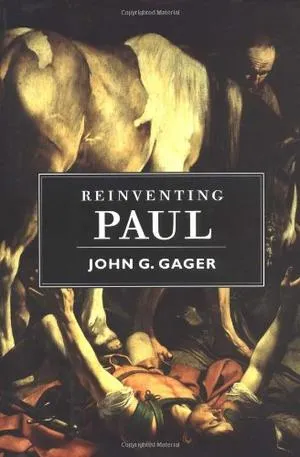This article was originally part of The Paul Page, a site dedicated to academic study of the apostle, with special focus on the work of N.T. Wright. Review by Robert Orlando.

John G. Gager (Oxford University Press), 2000, 198 pp.
Another book on Paul? Yes, the “new” Paul. Who is this new Paul? John Gager’s answer: the man whose mission has been distorted by twenty centuries of Pauline scholarship based on a faulty “old” paradigm influenced by anti-semitism (pp. 18,19, 74,75). Reinventing Paul purports that the old paradigm wrongly interprets Paul as “convert from Judaism to Christianity, who preached against the law and Israel” (pp. 18,19). These views, the author states, have unwittingly been the result of traditionalists reading Augustine, Luther, and Post-Holocaust thinkers into the ancient texts (pp. 38,66).
“For Paul, Israel’s salvation was never in doubt. What he taught and preached was instead a special path, a ‘Sonderweg’ for Gentiles” (p. 146).
This intriguing premise is what Mr. Gager attempts to prove, joining the movement of New Testament scholars including Lloyd Gaston, Stanley Stowers, and Krister Stendahl1 who agree that “Paul’s undeniably negative comments were never directed at the role of the law for Jews but for Gentiles” (pp. 44,106).
Gager’s introduction offers the reader a hermeneutic of “suspicion” (p. 13) to guard against “modern translations, dictionaries, and commentaries embedded within preexisting interpretations” (pp. 13-15). Five chapters follow, beginning with an interpretation of the old paradigm that redefines Paul as an “unreliable author,” offering a new paradigm for his writings, followed by an examination of Galatians and Romans respectively, and ending with Gager’s hopes for his “embattled minority” (pp. 145-147). He dismisses secondary biblical sources, restricts the arena for discussion to Paul’s letters to Galatia and Rome, and deflects Paul’s strongest rebukes toward the Jews onto the Jewish Christians, “missionaries within the Jesus movement” (pp. 58,62,106).
“Until the emergence of the new Paul, in recent decades,” Gager states, “the only readers who have been able to break free from the old Paul are the contradictionists — those who abandon all efforts to find a consistent meaning in Paul” (p. 129). However, the new paradigm argument stands or falls not with the citing of New Testament scripture alone, but “almost entirely on the question of audience”: was Paul speaking to Gentiles and Jews (cp. Rom. 1:16)? Yet, rather than explore Paul’s protean message,2 he assigns blame to traditionalist interpreters, arguing for “Paul’s unreliability” using an either/or filter to emphasize “contradictory” pro-Israel and anti-Israel scriptures (pp. 4-7). He concludes “standing against me are not merely twenty centuries of reading Paul as the father of Christian anti-Judaism, but the manifest tensions between the two sets of texts themselves” (pp. 40-42). As a result, the reader must dig one level below this false dichotomy of new and old paradigms to find the essence of Paul’s message.
Though a student of Meyer, Käsemann and Dahl, Gager never penetrates the mystery of Paul’s conversion:3 what caused the Pharisee trained by Gamaliel — likely the next high priest — to turn from his roots?4 Was he anti-semitic? No. His soliloquy from Romans (chapters 9-11) conveys an elegiac aide memoire to the Jews and their place in God’s divine plan.5 Furthermore, Gager’s study fails to note that beyond Jewish/Gentile issues, what Paul despised most was division (1 Cor. 11:18,19): laws or people that poisoned the collective spirit of the early church, which to him was unequivocally “neither Jew nor Greek” (1 Cor. 12:12, RSV). His mission seems not as Gager argues, a Sonderweg, “a special path for Gentiles,” but to broaden Jewish religious perception.6 Jewish-Christians, including Peter, loyal to their Jewish roots, demanded that Gentiles be circumcised and Paul vehemently disagreed (Gal. 2:11-16), raising the question that plagued the early church and nearly ended Paul’s ministry: would Christianity become a Jewish sect or a new religion?
Gager fails to recognize the potent allegations in Paul’s “undeniably negative comments” which circumvent Jewish/Jewish Christian distinctions, expressing his heartfelt beliefs touching the law and its effect on his converts (1 Cor. 9:20-23). Paul referred to his antagonists as preaching “another gospel” (Gal. 1:6,7, RSV) and the Jewish law as “a curse” (Gal. 3:13, RSV), “enslavement” (Gal. 5:1, RSV), and even “death” (2 Cor. 3:7, RSV). He described his Judaism as a former life and his escape from its psychological grip as akin to a widow’s liberation from her dead husband (Rom. 7:1-3). If we entertain Gager’s notion that Paul’s rebukes were solely for “Jewish Christians” (pp. 58,106) who wanted Paul to insist on Gentile circumcision, how much more severe would the criticism have been for the Jews who were seeking his arrest (2 Cor. 11:21-24)?
Unlike Mark Nanos’ subtler Mystery of Romans or Alan Segal’s Paul The Convert, Reinventing Paul,at times, reads like a reinvention itself, a loose diatribe, using selective reasoning that relies on political hot buttons to replace hard-thought polemics. It is the opinion of this writer that Mr. Gager’s ecumenical wish to heal old wounds of Jewish-Christian relations has come at the expense of biblical integrity and balanced exegesis. The search for common ground in this exciting dialogue will not be found in theories, but by providing evidence to fashion a new perspective.
- See Alan Segal’s comments on Stendahl in Richard Horsley, ed., Paul and Politics (Trinity Press), p. 190.
- Cf. The Writings of Paul, edited by Wayne Meeks (Norton), “The Christian Proteus,” p. 438.
- Alan F. Segal, Paul the Convert (Yale University Press), pp. 143-149.
- E.P. Sanders, Paul, Past Masters (Oxford University Press), pp. 8-10.
- J. Christian Beker, Heirs of Paul (Eerdmans), p. 26.
- Albert Schweitzer, The Mysticism of Paul (John Hopkins Univ. Press), pp. 1-3.





